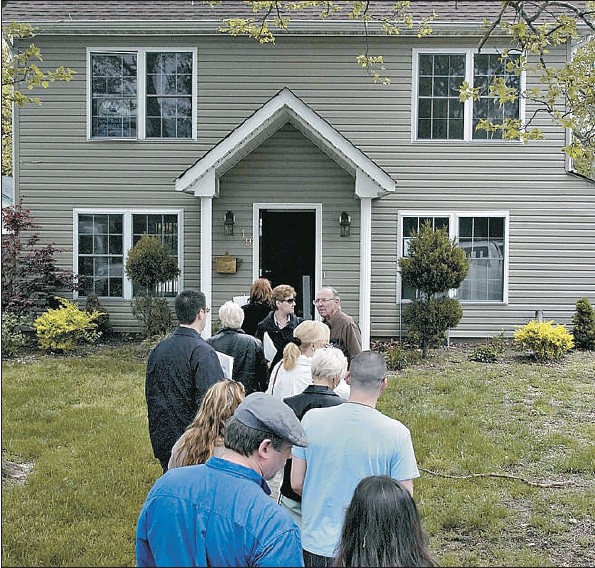With prices hitting two-year lows, now may be first-timers’ chance to get into the market
Derrick Penner
Sun

Gathering of the clan — potential homebuyers, that is, as dozens check out a prospective property that’s available. Photograph by : Vancouver Sun files

The British Columbia Real Estate Association on Friday reported that housing prices in the province hit 26-month lows, a fact that is helping to give potential first-time homebuyers a glimmer of hope of getting into a market that once seemed to be ascending out of reach.
In a recent poll, Ipsos Reid found that a one in five British Columbians reported they would consider a home purchase within the next two years. Just over half of that number said they are more likely to make that purchase than they were a year ago.
They aren’t ready to jump in immediately, report author Hanson Lok said in his assessment. Many are still waiting for prices to bottom out and the economy to stabilize, but “feel the situation is more advantageous today than a year ago.”
While they are waiting, however, there is a lot of homework for the potential first-time buyer to do and many questions to answer before making the plunge, and it starts with deciding whether or not home ownership is really right for them.
“People need to almost take a step back and ask, ‘Why would I buy a home?’” Julie Jaggernath, director of education at the Credit Counselling Society, said in an interview. “Home ownership isn’t for everybody.”
Home ownership is a big goal to work toward, Jaggernath said, and people have to decide whether it really fits into their personal goals, versus other quality-of-life activities people want to take on.
She suggests “test-driving” the monthly cost of home ownership. Calculate all the monthly costs of owning a home — from mortgage payment and maintenance fees, to taxes and utilities — and practice paying it.
Financial institutions maintain mortgage-qualifier calculators on their websites to help you calculate what you can afford to buy with your income and downpayment. And Vancity credit union includes a rent-versus-buy calculator that can help you figure out the financial cost/benefit of buying.
Take the difference between your rent and the ownership cost and set it aside in a savings account. Jaggernath said it can be an enlightening exercise for young people who are used to a certain lifestyle.
“That’s going to let you know, number one, can you afford it,” Jaggernath said, and whether or not you need to make some lifestyle changes in order to do so.
People have to remember, they have to be willing to make that payment for “not just six months, but the next 10 years while you own this home.”
The worst thing that will happen, Jaggernath said, is that you will have learned some important lessons and added some funds to your downpayment.
Peter Simpson, CEO of the Greater Vancouver Home Builders’ Association, said figuring out what you need versus what you want is important.
His first piece of advice is to “take your time, match your needs to your wallet.”
“The first rung on the home ownership ladder doesn’t have to be a giant one,” Simpson said. “It just has to be one that is carefully thought out.”
And there are lots of resources available for people to make sure they are thinking their decision through. Simpson’s organization offers a couple — an annual first-time buyers seminar that it conducts every year, usually in March, and some consumer information on its website.
Getting pre-approved for a mortgage is another good idea, Simpson said. Knowing what a bank is willing to lend you and what you can afford to spend can make your search more comfortable.
And make sure you have a full range of professional advice, from a mortgage specialist, realtor, a home inspector and even a lawyer or notary, Carolyn Heaney, business development manager for mortgage services at BMO in Vancouver, said in an interview.
“I can’t stress that enough,” Heaney said. “Don’t be ashamed to say you don’t know the answers.”
BMO publishes its own resource, a binder-bound kit called the “BMO First Time Essentials.”
On hiring a realtor, Dave Watt, president of the Real Estate Board of Greater Vancouver, suggested searching out real estate offices that operate in areas you want to live in, and ask their office managers for referrals.
Watt added that it is a good idea to interview two or three agents to make sure you get a good match.
“This is not a five-minute business relationship,” Watt said. The agent is the person you are entrusting not just to find you listings of homes you might buy, but will help advise you and then negotiate a deal.
Watt added that negotiations aren’t only about the purchase price. There are closing dates and other conditions of purchase that a first-time buyer wouldn’t necessarily be aware of that they will want help understanding during negotiations.
And as a first-time buyer is moving towards the finish line of their purchase, Heaney said they need to budget for the complete purchase, including closing costs and other one-time fees from the appraisal, home inspection, title transfer and insurance and conveyance.
Buyers also should not forget to factor in that moving is going to cost them money, and depending on the closing, they may be in line to pay an extra half-months utility costs and property taxes.
“You would hate for a customer to be in the lawyer’s office, and the bank tells them they have the money, but all of a sudden there’s another couple thousand dollars [to pay] between utilities and property taxes after they’ve spent their last dollar,” Heaney said.
© Copyright (c) The Vancouver Sun

